
Back Bodrum Afrikaans بودروم Arabic بودروم ARZ Bodrum Azerbaijani بودروم AZB Бадрум Byelorussian Бодрум Bulgarian Bodrum Breton Bodrum Catalan Бодрум CE
Bodrum | |
|---|---|
District and municipality | |
 | |
 Map showing Bodrum District in Muğla Province | |
| Coordinates: 37°02′N 27°26′E / 37.033°N 27.433°E | |
| Country | Turkey |
| Province | Muğla |
| Government | |
| • Mayor | Tamer Mandalinci [1] (CHP) |
Area | 650 km2 (250 sq mi) |
| Population (2023)[2] | 198,335 |
| • Density | 310/km2 (790/sq mi) |
| Time zone | UTC+3 (TRT) |
| Postal code | 48400 |
| Area code | 0252 |
| Website | www |

Bodrum (Turkish pronunciation: [ˈbodɾum]) is a town and district of Muğla Province, Turkey.[3] About 200 thousand people live in the district,[2] which covers 650 km2[4] and includes the town. It is a port town at the entrance to the Gulf of Gökova. Known in ancient times as Halicarnassus, the town was once home to the Mausoleum at Halicarnassus, also known as the tomb of Mausolus, one of the Seven Wonders of the Ancient World.
The town was founded by Dorian Greeks. It later fell under Persian rule and became the capital of the satrapy of Caria. Mausolus ruled Caria from here, and after his death in 353 BC, his wife Artemisia built a tomb, called the Mausoleum, for him. Macedonian forces laid siege to the city and captured it in 334 BC. After Alexander's death, the city passed to successive Hellenistic rulers and was briefly an independent kingdom until 129 BC, when it came under Roman rule. A series of natural disasters and repeated pirate attacks wreaked havoc on the area, and the city lost its importance by the time of the Byzantine era. The Knights Hospitaller arrived in 1402 and used the remains of the Mausoleum as a quarry to build Bodrum Castle. After the conquest of Rhodes by Suleiman the Magnificent in 1522, the town fell under Ottoman control as the Knights Hospitaller relocated to Europe.
By the 20th century, the town's economy was mainly based on fishing and sponge diving, but tourism has become the main industry in Bodrum since the late 20th century. The abundance of visitors has also contributed to Bodrum's retail and service industry. Milas–Bodrum Airport and Kos International Airport are the main airports that serve the town. The port has ferries to other nearby Turkish and Greek ports and islands, Kos being the most important. Most of the public transportation in the town is based on local share taxis and buses.
- ^ "The Mayor's Biography". Bodrum Municipality. Retrieved 19 May 2024.
- ^ a b Cite error: The named reference
tuikwas invoked but never defined (see the help page). - ^ Büyükşehir İlçe Belediyesi, Turkey Civil Administration Departments Inventory. Retrieved 19 September 2023.
- ^ "İl ve İlçe Yüz ölçümleri". General Directorate of Mapping. Retrieved 19 September 2023.

